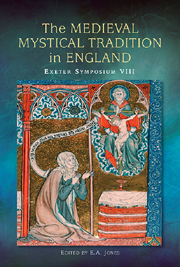 The Medieval Mystical Tradition in England
The Medieval Mystical Tradition in England Published online by Cambridge University Press: 05 July 2013
A woman […] is not made in the image of God; rather man is the image and glory of God and woman ought to be subject to man […] since man is the head of the woman and not the other way round.
This quotation from Liber extra by Bernard of Parma (d. 1266) typifies universal Christian perceptions of female incapacity prevalent during the whole of the Middle Ages, when women were politically, socially, legally and culturally disadvantaged in comparison with men. While women were proscribed from formal learning, preaching and teaching they could find a voice in devotional and contemplative expression in the Church, in which they were held fully answerable for the morality or immorality, orthodoxy or heterodoxy of their own actions and proclamations. This gave them a personally responsible role to play not only in the salvation of their own souls but also, by example and statement, in saving the souls of others. However, they were considered prone to moral failings, chiefly vanity, inconstancy, quarrelling and seductiveness, and needed the close guidance and management of men if they were to demonstrate their inherent but hidden qualities of modesty, compassion, charity and piety, as exemplified by the Blessed Virgin. C. Annette Grisé assesses the behaviour to be expected of devout women thus:
women are to be meek, silent and obedient, but they can also be learned, cultured, and well read (at least in devotional literature); they are to follow the examples of holy women (for example Mary and Bridget of Sweden) who are strong, articulate, and intelligent, so long as all of this is done in the service of God, as the ultimate (patriarchal) authority.
To save this book to your Kindle, first ensure [email protected] is added to your Approved Personal Document E-mail List under your Personal Document Settings on the Manage Your Content and Devices page of your Amazon account. Then enter the ‘name’ part of your Kindle email address below. Find out more about saving to your Kindle.
Note you can select to save to either the @free.kindle.com or @kindle.com variations. ‘@free.kindle.com’ emails are free but can only be saved to your device when it is connected to wi-fi. ‘@kindle.com’ emails can be delivered even when you are not connected to wi-fi, but note that service fees apply.
Find out more about the Kindle Personal Document Service.
To save content items to your account, please confirm that you agree to abide by our usage policies. If this is the first time you use this feature, you will be asked to authorise Cambridge Core to connect with your account. Find out more about saving content to Dropbox.
To save content items to your account, please confirm that you agree to abide by our usage policies. If this is the first time you use this feature, you will be asked to authorise Cambridge Core to connect with your account. Find out more about saving content to Google Drive.